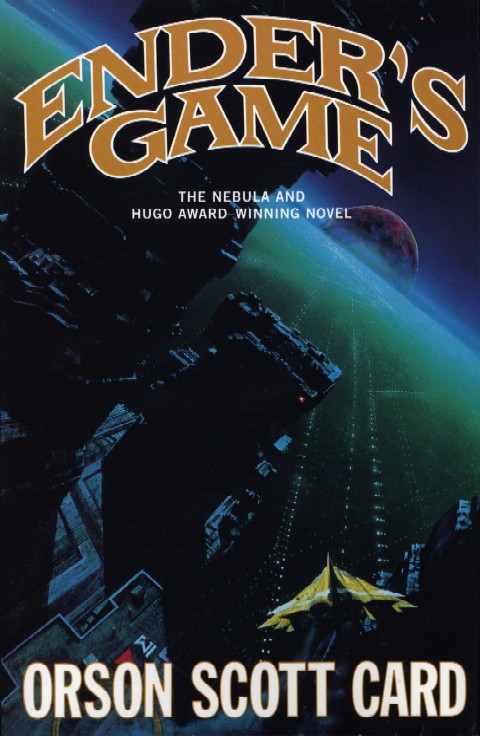
Orson Scott Card is your stereotypical conservative. He supports the War on Terror, doesn’t like Obama and would be very cruel to his son if he were gay. You’d think that such a person cannot write about accepting the different, or about how war is actually harsh. If you believe what they write about conservatives in the papers, then Ender’s Game should’ve been propaganda. It was supposed to be about how everyone but White American Males should be tortured, killed and then tortured some more.
Despite his religious fanaticism and homophobia, Ender’s Game is the complete opposite. It’s a novel that constantly sets up ideas and question them. Almost nothing is idealized here besides community living and that’s not even a big part of the story.
The most interesting thing about the novel is how it flips the story of the Boy Genius. Ender is a subversion of the Gary Stu. He is what every nerdy outcast want to be – an intelligent person who can use his mind to save the world.
The path to being a hero is harsh. Ender may have brains but you need more than a brain when you solve problems. Psychology is just as important. Card establishes the fact that Ender is gifted and examines how his personality changes when he’s pushed to his full potential.
Card doesn’t give Ender the easy path and he cares more about Ender himself than his skill. It’s actually the army officials who treat Ender like bad authors treat their cool characters. The army officials only care about his skill and pile on the challenges. They think that since Ender is so talented then he can face anything. It’s why bad authors who write talented characters tend to have ridiculous situations in the novel.
Ender solves every challenge he faces. He never fails and never has to deal with failure. Still, success is never easy. Card shows us the struggle, how stressed Ender is and the fact that failure is still possible no matter how talented he is. In fact, the stronger you are than the harsher that failure will be.
The portrait of war is also accurate. It’s mostly training and there aren’t spilling guts or torn limbs, but there’s more to war than this visual. It’s more focused on the psychological aspect of war and how harsh it is.
When there’s an enemy nothing else matters. Comfort, community, happiness and love are great but they’re meaningless when your life is under threat. Card’s greatness is that he doesn’t use this as a justification. He’s always aware that even if torturing Ender is necessary so he will defeat the buggers, it doesn’t make it any less damaging to him. The conclusion is that we have to sacrifice and that people like Ender have to go through these thins, but he doesn’t want to hide its effects.
The absurdity of military life isn’t mentioned here. It’s odd at first, because the Absurd is arguably the defining characteristic of the military. Then again, the story happens during an emergency. The Absurd of the military happens whe bueracracy cares too much about plant life, but here they don’t have time for that.
This was called by some a kiddie version of Starship Troopers, but isn’t that one pro-military? Ender’s Game is often more anti-war. It’s viewed as necessary in a situation of conflict, but the conflict itself is undesirable. No one wants it. There’s no conquest full of glory. It’s w ar for survival nobody wants but we have to go through.
More interesting is how the Enemy is portrayed. Card’s view is one that’s more commonly associated with left-wingers. By the end of the novel, the focus is on understanding the enemy, not defeatng it. The Buggers were an enemy, but they were also another intelligent form of life with their own unique culture. Once they’re destroyed it’s completely lost.
War is often a result of miscommunication. What causes it is when the methods of communication are so different they’re nearly impossible to bridge. The novel potrays this in how the Buggers communicate. Instead of speaking a different langauge, they have a whole different method of communication. It’s nearly impossible to communicate with them and that’s why the humans can’t do anything but fight them. It seems that violence is the one form of communication that’s universal, and the only message it can convey is hatred.
It’s a complex view of war, and it’s amazing Card can have all these ideas here and still make the story simple. It only shows that depth isn’t related to how the story looks, but what’s underneath the techniques.
In terms of style, Ender’s Game is written like a pulp novel. It’s a very easy read with simple, direct prose. The minimalism isn’t even stylish. The prose leans closer to Asimov, utilitarian without any quirks. That makes the story crystal clear, but it also makes for a dry tone.
The events of the novel are strong enough to stand on their own, but it lacks spice. Narrative techniques are nothing without events, but you use these techniques to show the meaning of events. Card leaves nothing to the imagination. Every thought, every psychology is stated clearly. He’s lucky his content is deep enough on its own, or else it would be annoying. Then again, it might just end up like a Foundation – a fun, straightforward Sci-Fi novel that doesn’t say much.
Ender’s Game is worth all the hype. This is the sort of book that you should give to your kids. They can relate to it and there’s cool stuff that will grab their attention. It will take your children seriously though, and give them something to think about. Even if Card is clear on what everything is, there are enough shades of grey to leave readers questioning rather than having their views affirmed.
4.5 hive queens out of 5
